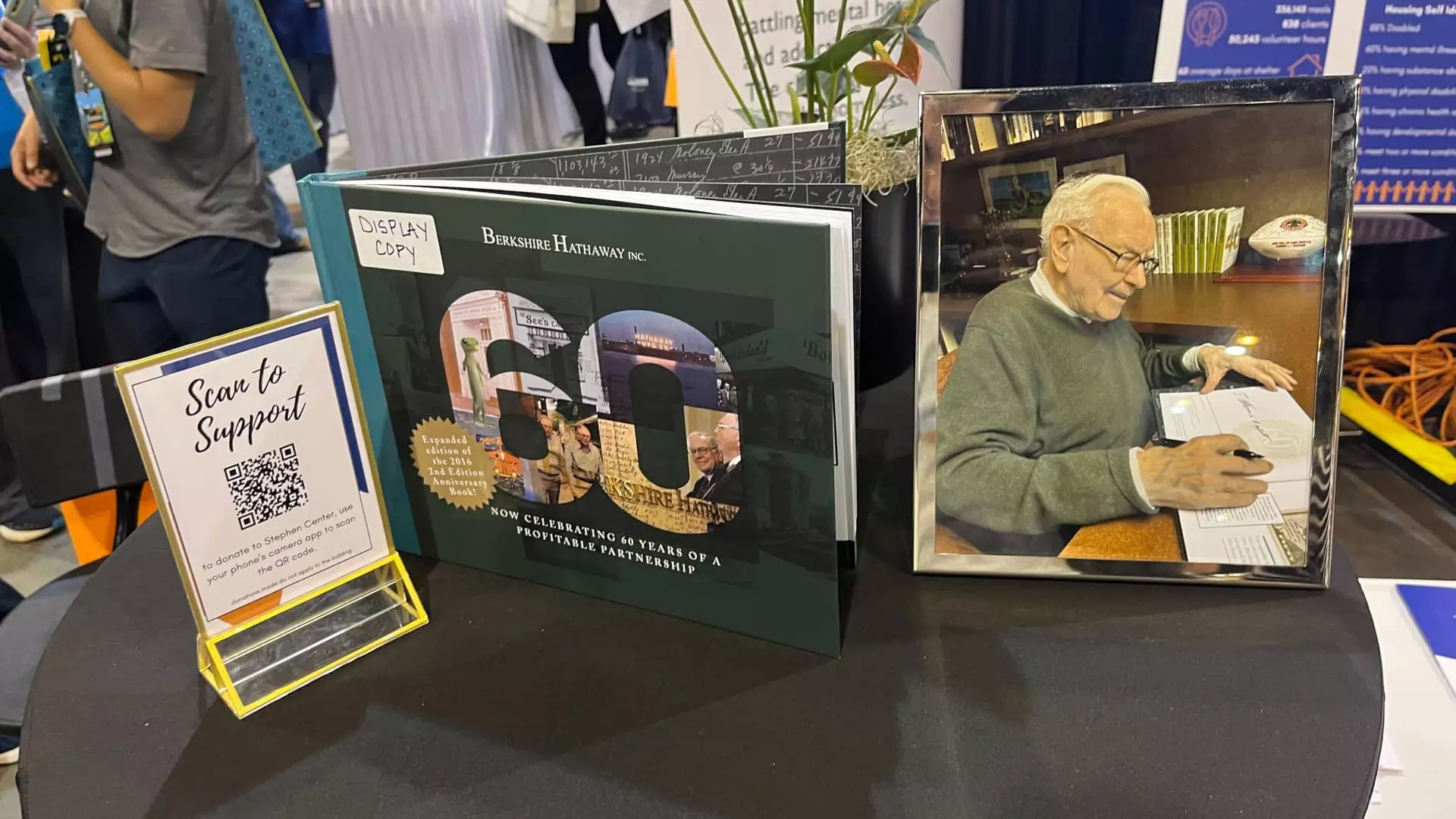In the realm of investing and philanthropy, few names resonate as profoundly as Warren Buffett. The recent nonprofit auction at Berkshire Hathaway’s annual meeting in Omaha, where memorabilia signed by Buffett fetched staggering sums, shines a light on two critical pillars: consumer behavior and the power of celebrity philanthropy. The fervor surrounding this event underscores the deep-rooted admiration investors have for Buffett, who, despite his staggering wealth, prioritizes charitable contributions, proving once again that altruism can magnify one’s legacy beyond financial success.
What drove participants to contribute tens of thousands of dollars for signed copies of “60 Years of Berkshire Hathaway?” It reflects not just a fascination with Buffett but also an inherent human desire to be part of something larger than themselves. People find meaning through connection, and for many, owning a piece of Buffett’s story represents a bridge to this legendary figure. A single bid of $100,000 emphasizes how much people are willing to pay to feel intertwined with his life and his ideals, effectively merging the concepts of investment and philanthropy.
Buffett’s Strategic Philanthropy
Buffett’s decision to set up the auction to benefit the Stephen Center—the shelter focused on housing and addiction recovery programs—highlights a well-thought-out strategy. By tapping into his popularity and personal history, Buffett raises awareness and substantial funds for local needs. His announcement to match every dollar contributes not only to the charity but also encourages collective involvement from participants; it creates a profound sense of community action, and spurs even non-attendees to donate.
This effort cultivates a culture of giving that stems from personal connection and an ingrained belief in local community enhancement. As the CEO of the Stephen Center noted, the event raised over $1.3 million, showcasing the tangible impact that can stem from aligning one’s values with action. Such maneuvers benefit not only the beneficiaries but also the benefactors, who walk away feeling a sense of fulfillment for having played a part in something impactful.
Unexpected Beneficiaries in a Shifting Economy
The sheer volume of donations seems even more remarkable against the backdrop of rising poverty rates and homelessness that increasingly afflict our communities. As reported, Omaha’s homeless population has seen an uptick of nearly 10%, with a concerning rise in family homelessness. Buffett’s role as a benefactor steering significant contributions toward such urgent needs magnifies the relevance of corporate social responsibility in today’s economy.
However, it raises a pivotal question: do high-profile individuals carry the onus of responsibility to tackle these societal issues? As Buffett himself stated in the past, he aims to leave behind a legacy devoid of dynastic wealth designed to free future generations from the shackles of entitlement. Yet, in doing so, his approach may set a challenging precedent, inadvertently shifting the fiscal responsibility from government and systemic change to monumental philanthropic gestures by the ultra-wealthy.
The Ripple Effect of Local Empowerment
The locals who bid on auction items are not merely spectators but are engaged participants eager to support their community. For instance, Matthew Rodriguez, a real estate professional and self-proclaimed “fan boy” of Buffett, paid $50,000 not just for a book, but to foster awareness and support for a cause he sees as transformative for Omaha. Such transactions echo broader truths about our interconnected lives; philanthropy often doesn’t stop at funding. Instead, it instigates conversations, connections, and, ultimately, change through shared experience.
Evidently, this plays into the idea of local empowerment—a term that recognizes the dual benefits of philanthropy: helping the needy while engaging the affluent. Just like many winners sift through their priorities, seeking to align personal goals with community improvement, community-centered approaches can lay a powerful groundwork for progress.
Buffett’s Ongoing Legacy of Charitable Giving
The auction exemplifies Buffett’s broader philosophy toward wealth, misjudged by many as mere charity. Buffett’s fundraising methods demonstrate not just his financial acumen but also illustrate a heartfelt commitment to humanitarianism that inspires others. His extensive history of charitable auctions, such as the iconic lunches to benefit Glide, reiterates his belief in the importance of giving back; it’s about closing the gap between wealth and necessity.
Buffett’s efforts extend beyond a simple act of giving—they symbolize a compelling narrative of moral obligation, encapsulated in his assertion of the importance of generating goodwill over wealth itself. Consequently, each auction, donation, and signature brings a ripple effect that influences future philanthropic endeavors among the affluent.
The essence of any charitable initiative, especially one entrenched within the values of a revered leader, is that it can extend both emotional and financial dividends to participants and beneficiaries alike. It compels an introspective dialogue about equity, ethics, and the potential for community-driven solutions to larger systemic issues, revitalizing hope and possibility in a post-pandemic world.

